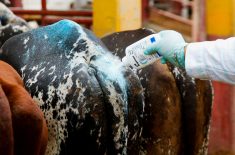A southern Quebec manufacturer of slaughter, cutting and deboning equipment has picked up over $400,000 in federal funds to develop new ways of removing specified risk materials (SRMs) from carcasses at abattoirs.
Industries Riopel, based at Vallee-Jonction, about 65 km southeast of Quebec City in the Chaudiere-Appalaches district, will get over $404,000 from the federal Slaughter Waste Innovation Program (SWIP), the government said Friday.
The SWIP funding is meant to back two separate research and development projects at Riopel to "maximize" the removal of SRMs and high-risk tissues from carcasses processed by Canadian abattoirs, the government said.
Read Also

U.S. not ready to lift Mexican cattle ban over screwworm, Agriculture Secretary Rollins says
The U.S. is not yet ready to reopen its border to Mexican cattle amid an outbreak of the flesh-eating New World screwworm parasite, Agriculture Secretary Brooke Rollins said, but she is pleased with Mexico’s efforts to contain the pest.
SRMs are the nervous-system tissues known to harbour the prions that cause bovine spongiform encephalopathy (BSE) in infected cattle.
The new SRM handling equipment Riopel is developing "will reduce waste materials and disposal costs, cutting back on the volume of SRM sent to landfills and also reduce greenhouse gas emissions associated with their transportation," the government said.
As well, the meat processing industry is expected to benefit from the "knowledge and expertise" related to SRM handling to be gained from the research aspect of the projects at Riopel, the government said.
"The new equipment being developed will also reduce the volume of (SRM) being disposed of, while at the same time ensuring compliance with Canada’s regulatory requirements," local MP Maxime Bernier, the federal minister of state for small business and tourism, said in the government’s release.
SWIP, budgeted for $40 million over three years, passed its third intake deadline on Oct. 31, to support research, development and commercialization or adoption of technologies and processes for SRMs’ removal, disposal or use.
The program requires successful applicants to complete their projects before the end of March 2013.










